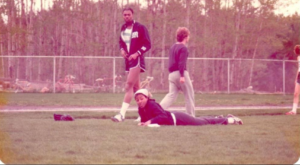What is Redshirting? Why would I be Redshirted?
Every NCAA Athlete is given ten semesters to graduate, and four seasons to play the sport they want at the school of their choice.
The moment you play in an organized competition with your team, the NCAA will view you as an active member on your team’s roster, and the season you’ve competed in will count towards your four seasons of college play.
It doesn’t matter if you competed for a second, a minute, or an hour.
This includes preseason, regular season, and postseason competitions (not off-season scrimmages or in-house showcases against your own team).
One way to preserve a season of play with the NCAA is to avoid competition altogether and have your coaches assign you a “redshirt” year.
There are many reasons why your coach would give you a redshirt season, but some common reasons are listed below:
- You are a freshman and need more time to develop strength and skill as an athlete before playing in competition.
- You were recently injured and are not expected to fully heal before the season arrives. Your coaches would prefer that you take a season off and come back stronger the year after.
- You are ill.
- You have a family emergency.
- You need maternity or paternity leave.
Although the term “redshirt” is not an official NCAA term, it’s a commonly used word in college athletics. Many athletes are redshirted at some point in their athletic careers.
The right and wrong way to look at redshirting.
Whether you just got redshirted, are thinking about redshirting, or are expecting to redshirt in the future; you need to consider all sides of the situation.
I wasn’t exactly happy when I found out that I would be redshirted for developmental purposes as a freshman at UNC Chapel Hill.
I felt like I was ready to contribute on game day, and was really looking forward to traveling and having the full student-athlete experience.
In truth, I was far behind my teammates from a skills standpoint, and coming from a southern state with embarrassing academic standards, I wasn’t ready to balance academia with a full-blown travel schedule.
In the end, redshirting my freshman year was a huge blessing that took off some pressure and allowed me to slowly catch up to the rest of my teammates.
When I started my redshirt journey, I allowed the term “redshirt” to define me. Some words I’d hear in my mind were, “Unprepared. Unworthy. Bad. Less than. A joke. Never going to play.” The lies I told myself were so far from the truth; but I allowed them to define how I practiced, trained, and communicated with my team during that year.
As you might have guessed, this is the wrong way to look at redshirting.
Just avoid going down that rabbit hole. It’s not good for you physically or mentally.
Here’s the truth: If your coaches decide to redshirt you for a season, it is because they see promise in you. In some cases, they will even pay an entire extra semester or year’s worth of tuition just to keep you on their team for one extra season. Trust me, they aren’t keeping you around longer because they hate you and don’t want to see you do well. These people are investing extra time and extra money in YOU. It is a good thing.
This is the correct way to think about your redshirt status. It is a symbol of promise, growth, and support.
Your coaches are using their power to protect you a little longer when they give you a redshirt year.
This is a good thing. It is that simple.
The Pros and Cons of being a Redshirt Athlete.
While there are many benefits to Redshirting and it should generally be considered as a good and healthy thing; it doesn’t come without some challenges.
You deserve to know exactly what to expect as a redshirt NCAA athlete, so I am going to share the good and the bad with you below.
The Cons:
CON #1: In most cases, you won’t be able to travel with your team during regular season games.
Believe it or not, budgets exist and your team probably has one. While some revenue-generating teams can afford to take every single athlete on their roster to away games, most teams can’t.
Think about it. Flights, buses, hotels, meals, per diem, etc. These expenses add up! A school can easily spend up to $2,000 to take ONE athlete to ONE in-conference away-game.
Lets role-play for a second:
You are an NCAA coach for a non revenue-generating team and you want to save some money so your team can have a nicer end-of-the-year banquet, better team-bonding trips, etc.
Now, answer me this:
Would you spend tens of thousands of dollars to send players, who are guaranteed NOT to play, all over the country to watch your team compete?
The answer is no. If you are smart, you’d leave the redshirts at home and save some money.
CON #2: You might not get the same gear that your active teammates will receive.
This ties back to traveling. If your teammates are receiving travel luggage, special winter jackets for a game that’s in rural Minnesota, etc – you may not get the same stuff if you aren’t traveling.
Yes, it’s a bummer, but again, you won’t need these things if you aren’t going to be traveling with the team.
It’s okay to be a little bit salty (I was). But I suggest getting over it sooner rather than later. You’ll get your gear next year, it will be updated by whatever sport apparel brand your college or university has a deal with, and it’ll be better quality than what your teammates got this season.
So really, you win.
CON #3: Your family, friends, significant others, and peers will come to your games and you will not be playing, at all.
My family came to maybe two of my home games when I was a redshirt. I was totally fine with that because,
- A) I definitely wasn’t going to play, and
- B) I didn’t like being on the bench and it showed. Not a good look.
Here’s the thing: Redshirting and sitting on the bench for an entire season is going to take a shot at your ego. You’re going to want to play. You’re going to feel a little envious of the athletes playing on game day.
It can be a humbling experience.
But eventually, you’ll have to come to peace with the fact that you will not be playing as a redshirt.
I recommend doing this sooner rather than later; otherwise you risk being bummed out all season.
Remember that you are an investment for your team and have a promising future.
CON #4: You will be expected to complete extra workouts and training sessions.
Just because your team is traveling Thursday – Sunday doesn’t mean you get to Netflix and Chill all weekend.
You’ve got an entire semester to get ahead of the pack with your fitness and strength. If your coaches know what’s good for you, you will be putting in extra work.
Expect to wake up early on Friday morning and head to the weight room. That’s how I began every weekend of my redshirt year.
You get used to it.
The Pros:
PRO #1: Extra Time To Acclimate.
Time is the most valuable currency in college athletics.
It’s common to hear coaches and athletes say things like, “If only Ashley had one more year with us.”, or, “If only we had an extra inning to play.”
When you are redshirting, time is on your side. You get an entire extra year to learn the ins and outs of being a student athlete, but without the added pressure of playing.
Take advantage of that.
PRO #2: Free time on the weekends.
When you’re done with your bonus workout and Friday classes, you’re essentially free to do what you want.
Now, what you do with that time is up to you; and I highly recommend you use it wisely.
Either way, time is valuable and having the extra hours to catch up on school work, hang with friends, and enjoy campus life is a huge benefit of being a redshirt.
PRO #3: You get an extra semester in college.
This is, by far, the most significant benefit of being a redshirt athlete.
Having an extra semester to develop as an athlete, prepare for the pros, start a Master’s program, and plan for life after sport is a straight up LUXURY.
We will discuss how you should be planning for your fifth year later in this article.
PRO #4: You may get an extra PAID semester in college.
Piggy-backing off of Pro #2, Redshirt athletes on scholarship are the biggest winners of all college students – IF they are wise.
The fact that you could potentially have both your undergraduate AND postgraduate degrees paid for by your school’s athletic department is BEYOND IDEAL.
Most students leave college with $80k worth of debt and student loans.
Just let that soak in.
When you’re done, start planning for your fifth year.
The Dos and Don’ts of being a Redshirt Athlete.
Now that you know exactly what to expect in your redshirt year, I’d like to share some very practical advice with you to keep you on track.
You’ll be wanting to take advantage of all of that extra free time on your hands, and not using it to build a case against you so that your coaches won’t want to play you next season.
With that said, these are the Do’s and Don’ts of Redshirting. I really wish someone had written this out for me when I was a young one.
The Do’s:
Do #1: Engage In Campus Life
Your redshirt year is the ONLY year you will ever get to fully experience your school’s campus in the fall, spring, or winter (depending on when your sport is in season).
Next season, when you are playing and traveling with your team, you won’t be able to go out and about during this time of year with the same freedom you have now.
Take advantage of it. Go to games. Create bonds with athletes who have different seasons than you. Join a club. Take a weekend trip.
Remember, you only live once – so make sure you are engaging as best as you can during this time.
Do #2: Plan Your Fifth Year
As I mentioned above, you can potentially have an extra semester or year of college paid in full for you.
Chat with an academic advisor and see what your options are. If you are on scholarship, I HIGHLY recommend trying to graduate in the normal four years and using your fifth year to begin a master’s program.
Even if you aren’t on scholarship, athletic departments can have some pull in getting you admitted into a program. I’ve known athletes who started a grad program in their fifth year, left to go pro in their sport, and then came back later to complete their education.
Do what’s best for you, but I’m telling you – you’re going to want to consider the extra education benefits that can come out of this redshirt deal.
Do #3: Train Hard.
Now is not the time to slack off. As a redshirt athlete, you are behind the rest of the pack. You should be training with the intention to kick some a** – not to simply catch up.
Talk to your strength trainer and set realistic goals for yourself this season. Challenge yourself to see how strong you can get. You’ll want to be a well-oiled machine when it’s time to compete.
Take practice seriously. You may not be on the number one practice team yet, but that doesn’t mean you can’t sweep in and surprise everyone later on.
Work your absolute hardest and know that you are just as worthy and capable as anyone else on your team.
Do #4: Stay in contact with your coaches and teammates while they’re on the road.
FaceTime your team and ask them for text updates about the games, travel, and what’s going on on the road.
It’s important to show both your teammates and coaches that you care about their wellbeing, even when they’re gone.
It can also help you feel better connected to the rest of your team when they return from their trip. Redshirting can feel isolating at times, so be sure you are fostering those relationships at all times.
Do #5: Study.
Keep your academic game strong this semester. You have extra time to study, get tutoring, and visit office hours – USE IT.
It doesn’t get any easier from here, so, make sure you are positioning yourself as best you can for the semesters when you will need to rely on the gpa you’ve already buffed up.
The Don’ts:
Don’t #1: Spend all of your time partying.
Most college kids party, I’m not ignorant to this fact and, honestly, I had my fair share of nights out with my teammates.
With that said, you will want to act responsibly as a redshirt athlete when it comes to navigating the night-life social scene on campus.
It’s not a great look to spend both Friday and Saturday night out, partying, while your teammates are busting their butts at an away game.
It’s also important to note that whatever you decide to put into your body over the weekend will have an impact on your athletic performance during the week. Let’s remember that you are competing with your teammates for a spot to play.
Will excessive partying help you get there? No.
Don’t #2: Netflix and Chill all weekend.
Revisit Do #1 if you need further reason to avoid wasting away in your dorm room all weekend.
Once again, you only live once. You’ll only be in college once. You’ll only be a redshirt athlete once. Do you really want to spend the whole time watching television? No.
Don’t #3: Get caught up in compromising situations or useless relationships.
This season is all about becoming the best you can be.
Your redshirt semester is a time when you should be maturing; physically, mentality, and emotionally.
Think before you act. Avoid people and situations that make you feel uncomfortable or insecure. No one has time for that, and especially not you this semester.



